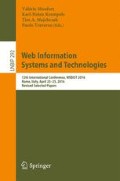Abstract
Sentiment analysis (also known as opinion mining) is frequently used in monitoring public opinions on the internet. For example, it can help marketers evaluate the success of an ad campaign. It can also be used to assess public opinions during a political campaign. As a result, many businesses and organizations are exploring the potential value of employing sentiment analysis as a part of their business and social intelligence strategies. However, the technology isn’t fully mature yet. As a result, if not used carefully, the results from sentiment analysis can be misleading. In this paper, we present an empirical investigation of the effectiveness of using current sentiment analysis tools to assess people’s opinions in five different domains. The results were very uneven, from decent (e.g., hotel reviews) to poor (e.g., comments on public policies). We also proposed several effectiveness indicators that can be used to signal the appropriateness of using these tools in specific domains.
Access this chapter
Tax calculation will be finalised at checkout
Purchases are for personal use only
Notes
- 1.
- 2.
- 3.
- 4.
- 5.
- 6.
- 7.
- 8.
- 9.
- 10.
References
Andreevskaia, A., Bergler, S.: Unsupervised sentiment analysis with emotional signals. In: 11th Conference of the European Chapter of the Association for Computational Linguistics, EACL 2006 (2006)
Belkin, D.: Harvard accused of bias against Asian-Americans. Wall Street J. (2015). http://www.wsj.com/articles/asian-american-organizations-seek-federal-probe-ofharvard-admission-policies-1431719348
Bob Lannon, A.P.: What can we learn from 800,000 public comments on the FCC’s net neutrality plan? @ONLINE (2014)
Chung, W., Zeng, D.: Social-media-based public policy informatics: sentiment and network analyses of U.S. immigration and border security. J. Assoc. Inf. Sci. Technol. 67(7), 1588–1606 (2015)
Diakopoulos, N.A., Shamma, D.A.: Characterizing debate performance via aggregated twitter sentiment. In: Proceedings of the SIGCHI Conference on Human Factors in Computing Systems, CHI 2010, pp. 1195–1198. ACM, New York (2010)
Ghose, A., Ipeirotis, P.G., Sundararajan, A.: Opinion mining using econometrics: a case study on reputation systems. In: Proceedings of the 44th Annual Meeting of the Association for Computational Linguistics (2007)
Hu, X., Tang, J., Gao, H., Liu, H.: Unsupervised sentiment analysis with emotional signals. In Proceedings of the 22nd International Conference on World Wide Web, WWW 2013, Republic and Canton of Geneva, Switzerland, pp. 607–618. International World Wide Web Conferences Steering Committee (2013)
Kilgarriff, A., Rose, T.: Measures for corpus similarity and homogeneity. In: 3rd Conference on Empirical Methods in Natural Language Processing (1998)
Liu, B.: Sentiment Analysis and Opinion Mining. Morgan and Claypool, New York (2012)
Maynard, D., Funk, A.: Automatic detection of political opinions in tweets. In: García-Castro, R., Fensel, D., Antoniou, G. (eds.) ESWC 2011. LNCS, vol. 7117, pp. 88–99. Springer, Heidelberg (2012). doi:10.1007/978-3-642-25953-1_8
Pang, B., Lee, L.: A sentimental education: sentiment analysis using subjectivity. In: Proceedings of ACL, pp. 271–278 (2004)
Pang, B., Lee, L.: Opinion mining and sentiment analysis. Found. Trends Inf. Retr. 2(1–2), 1–135 (2008)
Pang, B., Lee, L., Vaithyanathan, S.: Thumbs up? Sentiment classification using machine learning techniques. In Proceedings of the ACL-02 Conference on Empirical Methods in Natural Language Processing, EMNLP 2002, Stroudsburg, PA, USA, vol. 10, pp. 79–86. Association for Computational Linguistics (2002)
Pappas, N., Katsimpras, G., Stamatatos, E.: Distinguishing the popularity between topics: a system for up-to-date opinion retrieval and mining in the web. In: 14th International Conference on Intelligent Text Processing and Computational Linguistics (2013)
Plackett, R.L.: Karl pearson and the chi-squared test. Int. Stat. Rev. 51, 59–72 (1983)
Read, J., Carroll, J.: Weakly supervised techniques for domain-independent sentiment classification. In: Proceedings of the 1st International CIKM Workshop on Topic-Sentiment Analysis for Mass Opinion, TSA 2009, New York, NY, USA, pp. 45–52 (2009)
Shi, H.-X. and Li, X.-J.: A sentiment analysis model for hotel reviews based on supervised learning. In: 2011 International Conference on Machine Learning and Cybernetics (ICMLC), vol. 3, pp. 950–954 (2011)
Singhal, A.: Modern information retrieval: a brief overview. IEEE Data Eng. Bull. 24(4), 35–43 (2001)
Turney, P.D.: Thumbs up or thumbs down? Semantic orientation applied to unsupervised classification of reviews. In: Proceedings of the 40th Annual Meeting on Association for Computational Linguistics, ACL 2002, Stroudsburg, PA, USA, pp. 417–424. Association for Computational Linguistics (2002)
Wang, H., Can, D., Kazemzadeh, A., Bar, F., Narayanan, S.: A system for real-time twitter sentiment analysis of 2012 U.S. presidential election cycle. In: Proceedings of the ACL 2012 System Demonstrations, ACL 2012, Stroudsburg, PA, USA, pp. 115–120. Association for Computational Linguistics (2012)
Wang, H., Lu, Y., Zhai, C.: Latent aspect rating analysis without aspect keyword supervision. In Proceedings of the 17th ACM SIGKDD International Conference on Knowledge Discovery and Data Mining, KDD 2011, New York, NY, USA, pp. 618–626 (2011)
Peng, W., Park, D.H.: Generate adjective sentiment dictionary for social media sentiment analysis using constrained nonnegative matrix factorization. In: The International AAAI Conference on Web and Social Media, ICWSM (2011)
Zhou, X., Tao, X., Yong, J., Yang, Z.: Sentiment analysis on tweets for social events. In: 2013 IEEE 17th International Conference on Computer Supported Cooperative Work in Design (CSCWD), pp. 557–562 (2013)
Author information
Authors and Affiliations
Corresponding authors
Editor information
Editors and Affiliations
Rights and permissions
Copyright information
© 2017 Springer International Publishing AG
About this paper
Cite this paper
Ding, T., Pan, S. (2017). How Reliable Is Sentiment Analysis? A Multi-domain Empirical Investigation. In: Monfort, V., Krempels, KH., Majchrzak, T., Traverso, P. (eds) Web Information Systems and Technologies. WEBIST 2016. Lecture Notes in Business Information Processing, vol 292. Springer, Cham. https://doi.org/10.1007/978-3-319-66468-2_3
Download citation
DOI: https://doi.org/10.1007/978-3-319-66468-2_3
Published:
Publisher Name: Springer, Cham
Print ISBN: 978-3-319-66467-5
Online ISBN: 978-3-319-66468-2
eBook Packages: Computer ScienceComputer Science (R0)

